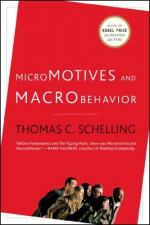
|
| Name: _________________________ | Period: ___________________ |
This quiz consists of 5 multiple choice and 5 short answer questions through Chapter 7: Hockey Helmets, Daylight Saving, and Other Binary Choices.
Multiple Choice Questions
1. What additional reason does Schelling give for the desire to sit in the back of a theater?
(a) People want to be prepared to flee.
(b) People want to watch people arrive.
(c) People want to feel safe in the dark.
(d) People want to be far from the stage.
2. What is the second thing Schelling says a social behavior model can be?
(a) A dialogue about the nature of the evidence in a certain system.
(b) An actual biological or mechanical system that embodies a certain relationship.
(c) A piece of evidence from which an entire system can be deduced.
(d) A theory that explains a preponderance of evidence.
3. What does Schelling say about Christmas cards?
(a) They do not follow any laws of distribution.
(b) Sometimes they are sent out of guilt.
(c) There is generally a balance between how many each person receives.
(d) They make a map of social relations.
4. What does the heating-system-like aspect of human behavior seek, in Schelling's analysis?
(a) Emptiness.
(b) Perpetual comfort.
(c) Relief from tension.
(d) An appropriate level.
5. How does Schelling arrive at the number of genetic possibilities in two people's offspring?
(a) By dividing the number of possible eggs and the number of possible sperm.
(b) By running the eggs and sperm through polymerase chain reactions.
(c) By adding the number of possible eggs and the number of possible sperm.
(d) By multiplying the number of possible eggs and the number of possible sperm.
Short Answer Questions
1. What does Schelling say about segregation?
2. What does Schelling say happens when the youngest ten percent of a population moves?
3. What does Schelling use his lecture to an audience of 800 people to illustrate?
4. What does Schelling say the simplest model of a closed system with a density enhancement contains?
5. What does Schelling say is an atomic pile is an example of?
|
This section contains 381 words (approx. 2 pages at 300 words per page) |

|




